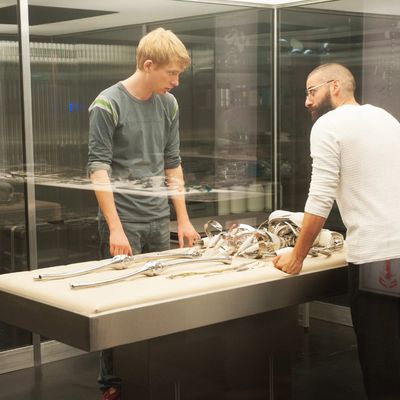
Clever novelist and screenwriter Alex Garland makes a half-dandy directorial debut with Ex Machina, a sci-fi film that — like much of his work — fakes excitingly in the direction of breaking new ground before turning formulaic so fast. The excellent Domhnall Gleason is a computer programmer who wins a trip to the subterranean compound (an awe-inspiring assemblage of primordial boulders and glass partitions) of his overly chummy employer, a multi-billionaire search-engine mogul played by Oscar Isaac. It appears that the boss-man has lassoed the moon by creating an artificial life form that might, just might — wait for it — be both sentient and have a gorgeous, fully functional female body. Gleason is supposed to take her for a test run, so to speak. Her name is Ava, and she’s a piece of work.
You couldn’t recognize Isaac by looking at him. He’s short and beefy, with a shaved head and thick black beard — bottom-heavy. He has the same vocal rhythms as always, though: overdeliberate, as if he took English As a Second Language from David Mamet. That diction is the giveaway that there’s some kind of con going on. But what is his game? Alas, it has nothing to do with presumably unique properties of the man-machine fusion known as the singularity, and everything to do with James M. Cain and the noir-ish world of abusive husband-masters, wily female slaves, and poor-sap male ingénues.
But Ava … Ava … She’s played by the 26-year-old Swede Alicia Vikander, and she’s one of the most creepily alluring creations in the annals of sci-fi. She wanders her glorified cage like a futuristic faun, her lissome limbs transparent, wires curling along her torso in the shape of a spine, while a xylophone provides an ethereal plink. Vikander was a ballet dancer, and she has what Mikhail Baryshnikov had in his too-brief career as an actor: a lightness of tread, a lift that makes you sure the normal rules of gravity don’t apply to her. The movie’s design and special effects are, indeed, marvelous, but what makes Ava amazing is all human.


